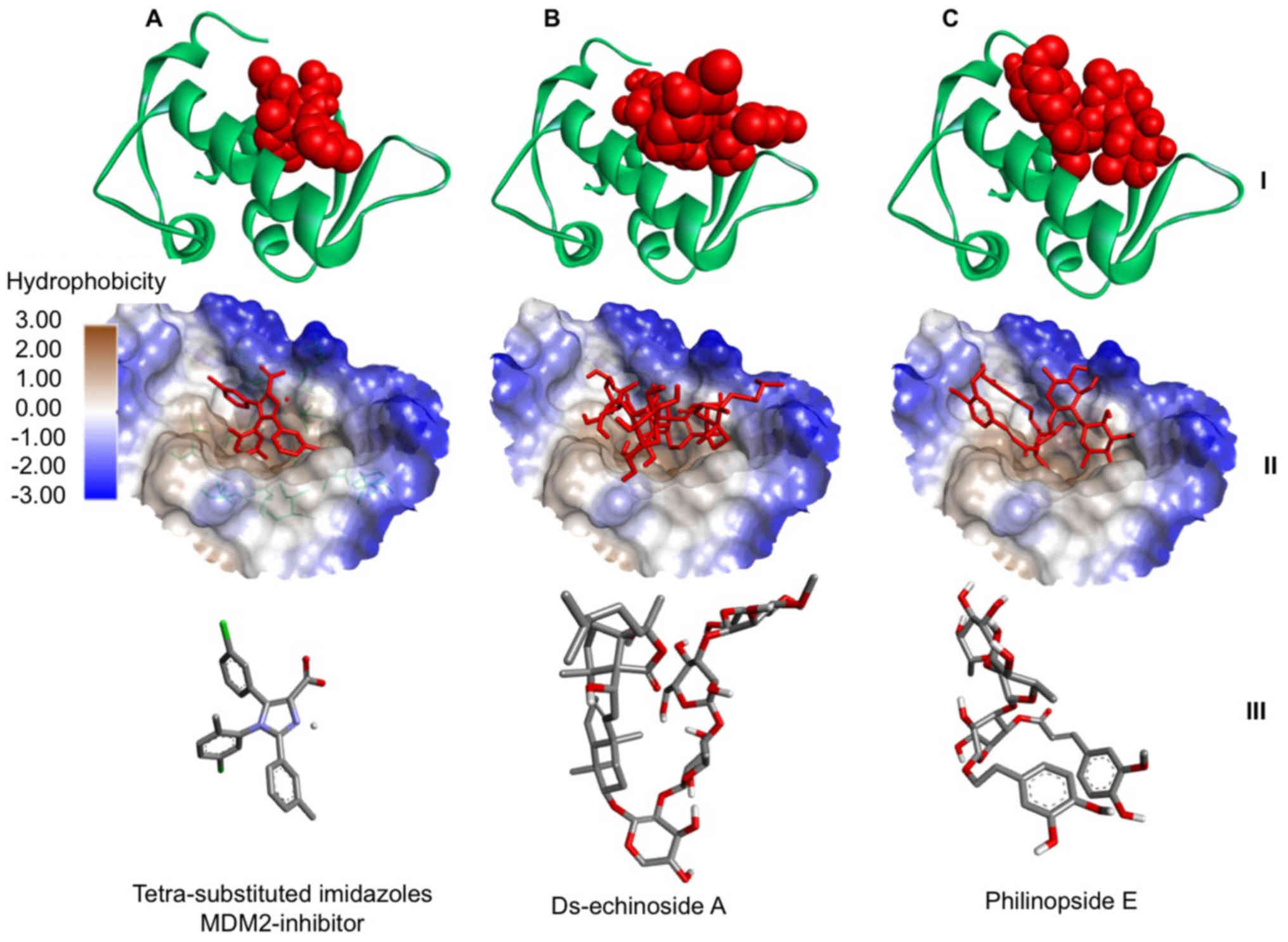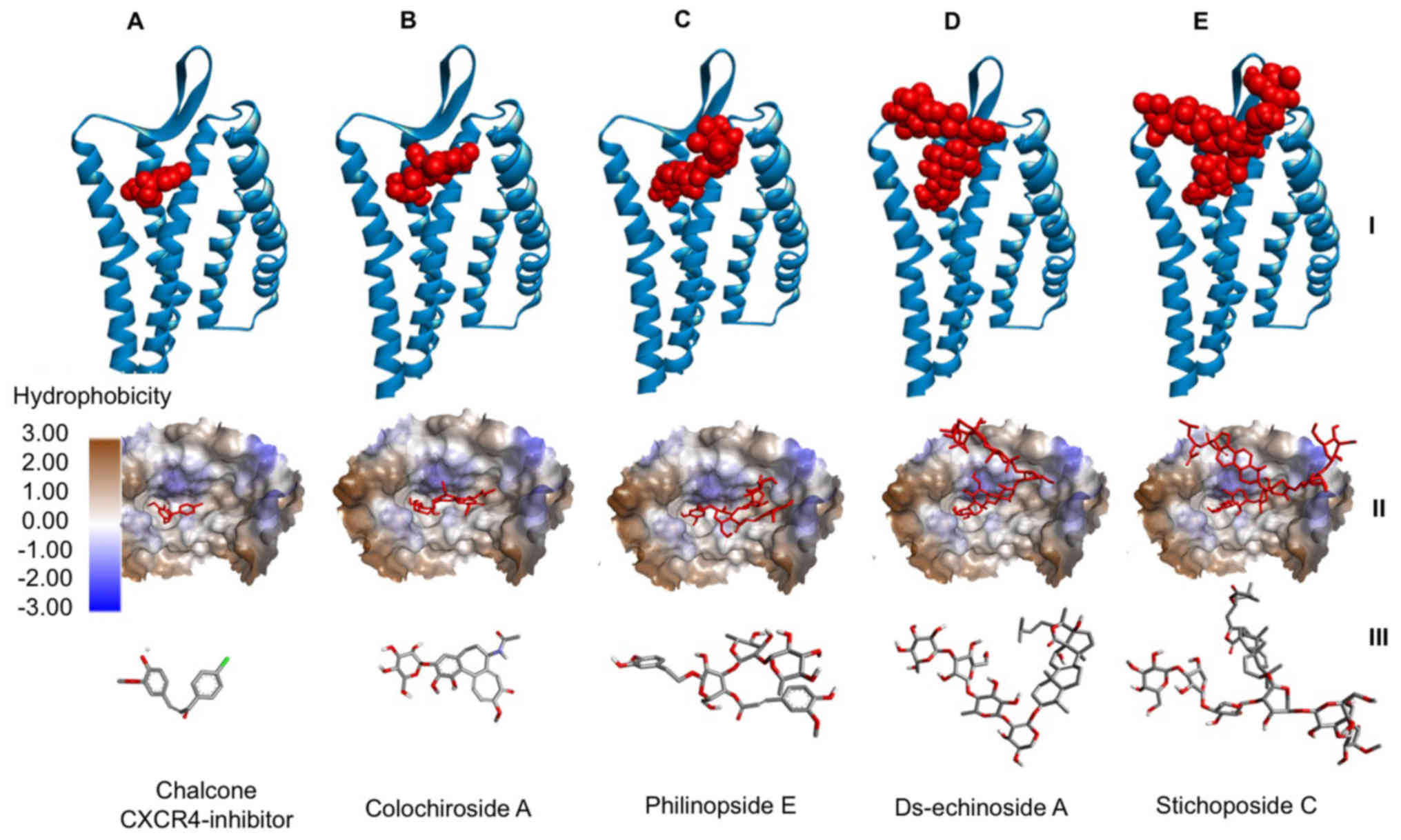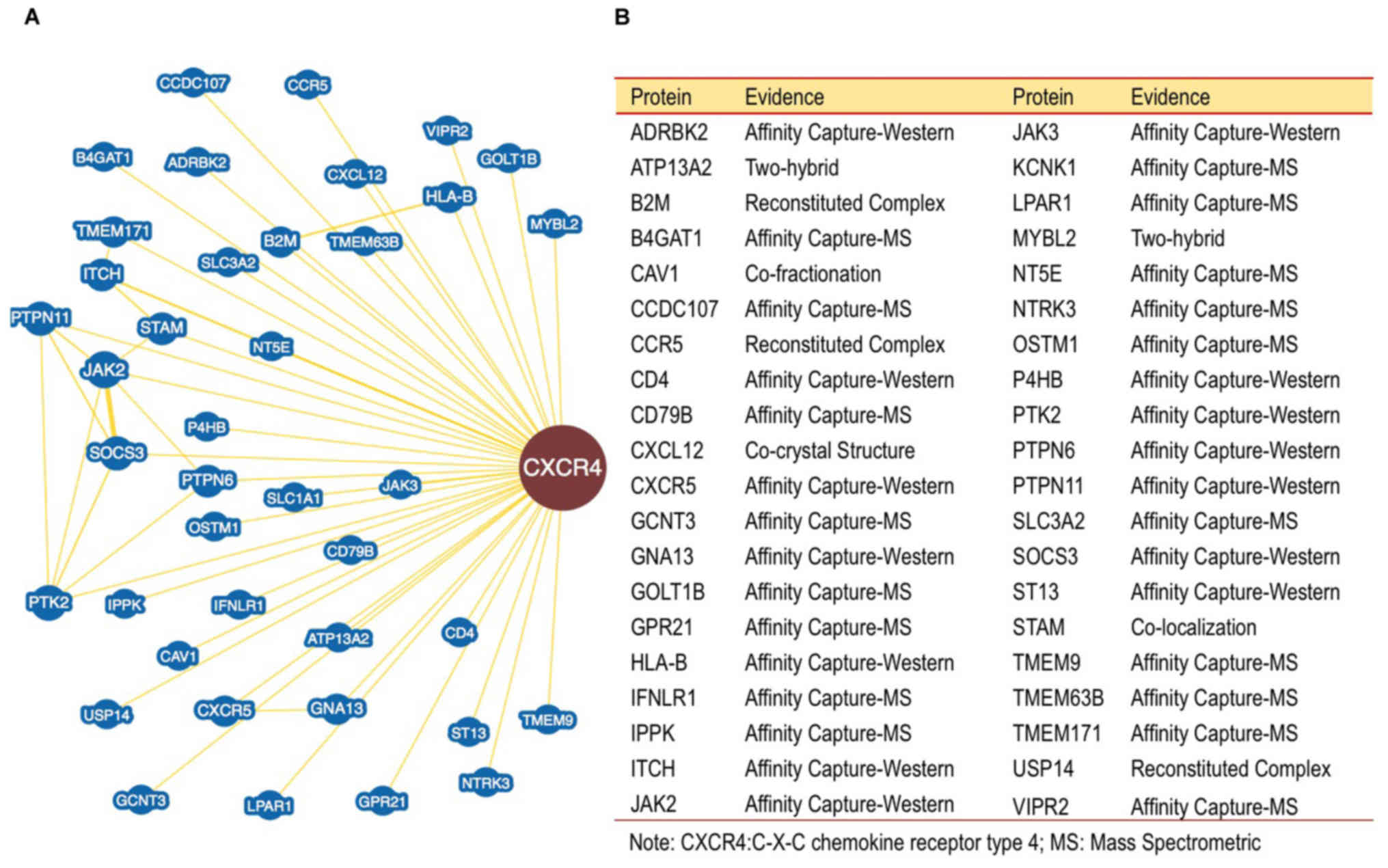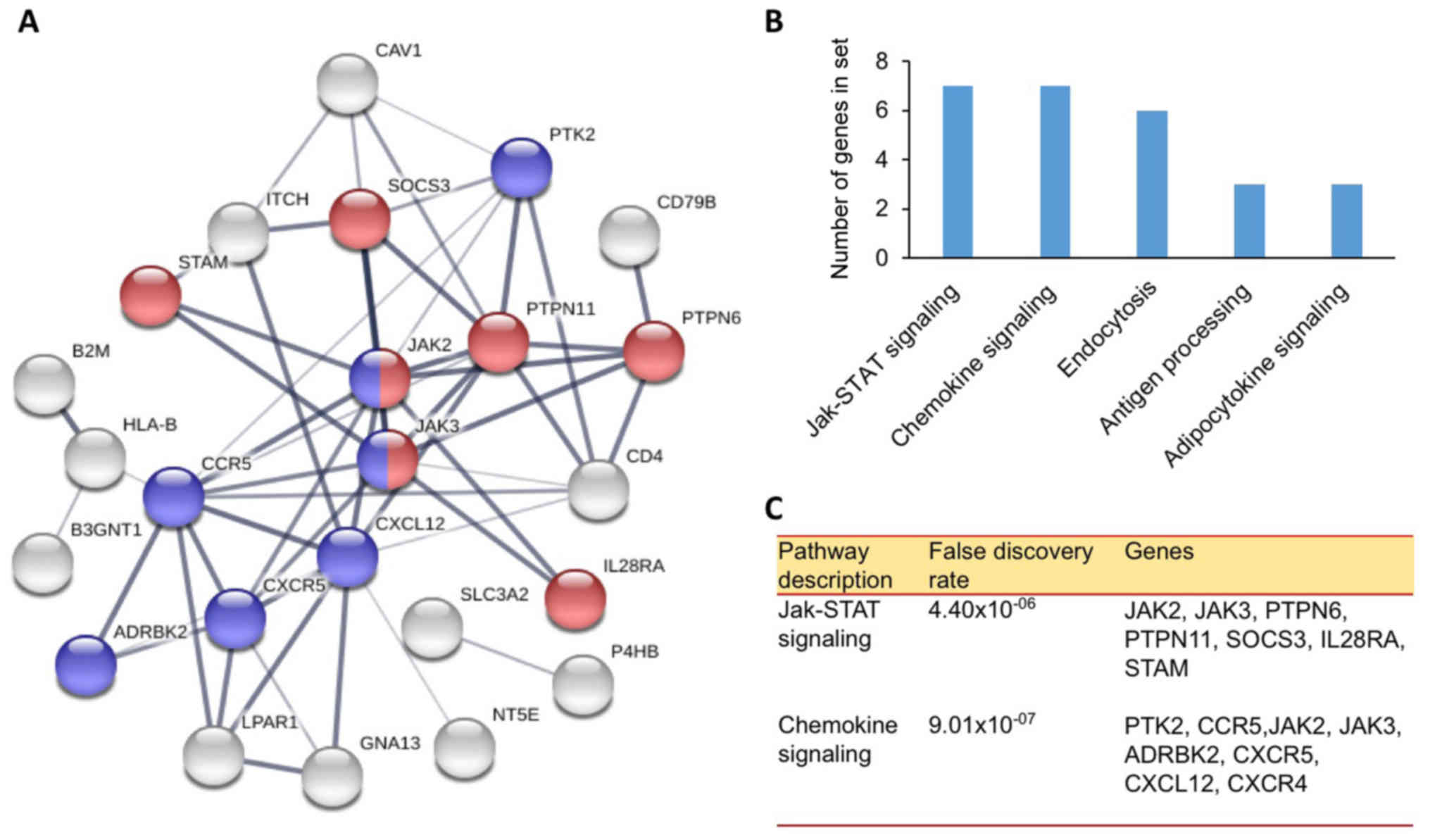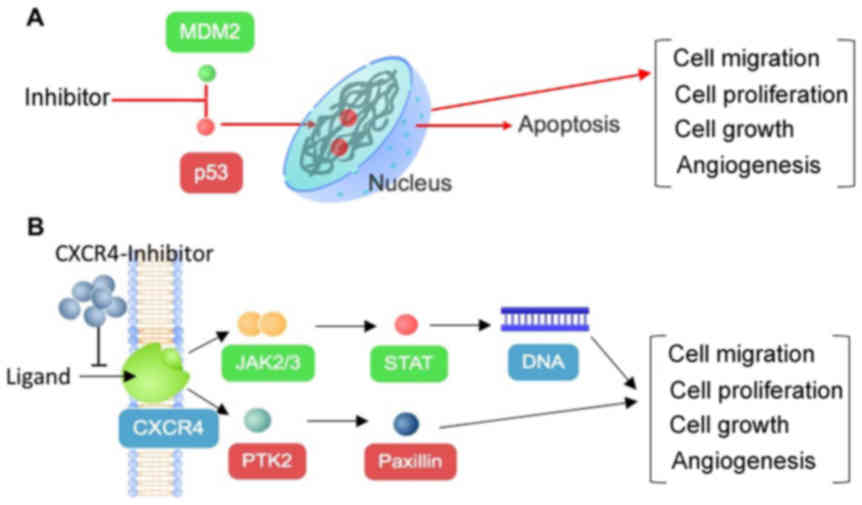|
1
|
Khazaei S, Salehiniya H and
Mohammadian-Hafshejani A: Some facts about cancer in the world
using registered cancer in 2012. Iran J Public Health.
44:1559–1560. 2015.PubMed/NCBI
|
|
2
|
Chary KV and Pandian K: Accelerated
approval of drugs: Ethics versus efficacy. Indian J Med Ethics.
2:244–247. 2017. View Article : Google Scholar : PubMed/NCBI
|
|
3
|
Pilié PG, Johnson AM, Hanson KL, Dayno ME,
Kapron AL, Stoffel EM and Cooney KA: Germline genetic variants in
men with prostate cancer and one or more additional cancers.
Cancer. 123:3925–3932. 2017. View Article : Google Scholar : PubMed/NCBI
|
|
4
|
Wargasetia TL, Permana S and Widodo: The
role of sea cucumber active compound and its derivative as an
anti-cancer agent. Curr Pharmacol Rep. 4:27–32. 2018. View Article : Google Scholar
|
|
5
|
Janakiram NB, Mohammed A and Rao CV: Sea
cucumbers metabolites as potent anti-cancer agents. Mar Drugs.
13:2909–2923. 2015. View Article : Google Scholar : PubMed/NCBI
|
|
6
|
Zhang Y and Yi Y: Studies on antitumor
activities of triterpene glycoside colochiroside A from sea
cucumber Colochirus anceps. Zhongguo Zhong Yao Za Zhi. 36:504–507.
2011.(In Chinese). PubMed/NCBI
|
|
7
|
Zhao Q, Liu Z, Xue Y, Wang JF, Li H, Tang
QJ, Wang YM, Dong P and Xue CH: Ds-echinoside A, a new triterpene
glycoside derived from sea cucumber, exhibits antimetastatic
activity via the inhibition of NF-κB-dependent MMP-9 and VEGF
expressions. J Zhejiang Univ Sci B. 12:534–544. 2011. View Article : Google Scholar : PubMed/NCBI
|
|
8
|
Tian F, Zhu CH, Zhang XW, Xie X, Xin XL,
Yi YH, Lin LP, Geng MY and Ding J: Philinopside E, a new sulfated
saponin from sea cucumber, blocks the interaction between kinase
insert domain-containing receptor (KDR) and alphavbeta3 integrin
via binding to the extracellular domain of KDR. Mol Pharmacol.
72:545–552. 2007. View Article : Google Scholar : PubMed/NCBI
|
|
9
|
Sugawara T, Zaima N, Yamamoto A, Sakai S,
Noguchi R and Hirata T: Isolation of sphingoid bases of sea
cucumber cerebrosides and their cytotoxicity against human colon
cancer cells. Biosci Biotechnol Biochem. 70:2906–2912. 2006.
View Article : Google Scholar : PubMed/NCBI
|
|
10
|
Yun SH, Park ES, Shin SW, Na YW, Han JY,
Jeong JS, Shastina VV, Stonik VA, Park JI and Kwak JY: Stichoposide
C induces apoptosis through the generation of ceramide in leukemia
and colorectal cancer cells and shows in vivo antitumor activity.
Clin Cancer Res. 18:5934–5948. 2012. View Article : Google Scholar : PubMed/NCBI
|
|
11
|
Nag S, Qin J, Srivenugopal KS, Wang M and
Zhang R: The MDM2-p53 pathway revisited. J Biomed Res. 27:254–271.
2013.PubMed/NCBI
|
|
12
|
Bally C, Adès L, Renneville A, Sebert M,
Eclache V, Preudhomme C, Mozziconacci MJ, de The H, Lehmann-Che J
and Fenaux P: Prognostic value of TP53 gene mutations in
myelodysplastic syndromes and acute myeloid leukemia treated with
azacitidine. Leuk Res. 38:751–755. 2014. View Article : Google Scholar : PubMed/NCBI
|
|
13
|
Xu C, Zhao H, Chen H and Yao Q: CXCR4 in
breast cancer: Oncogenic role and therapeutic targeting. Drug Des
Devel Ther. 9:4953–4964. 2015.PubMed/NCBI
|
|
14
|
Kremer KN, Peterson KL, Schneider PA, Meng
XW, Dai H, Hess AD, Smith BD, Rodriguez-Ramirez C, Karp JE,
Kaufmann SH and Hedin KE: CXCR4 chemokine receptor signaling
induces apoptosis in acute myeloid leukemia cells via regulation of
the Bcl-2 family members Bcl-XL, Noxa, and Bak. J Biol Chem.
288:22899–22914. 2013. View Article : Google Scholar : PubMed/NCBI
|
|
15
|
Peng SB, Zhang X, Paul D, Kays LM, Ye M,
Vaillancourt P, Dowless M, Stancato LF, Stewart J, Uhlik MT, et al:
Inhibition of CXCR4 by LY2624587, a fully humanized anti-CXCR4
antibody induces apoptosis of hematologic malignancies. PLoS One.
11:e1505852016.
|
|
16
|
Zheng T, Chou J, Zhang F, Liu Y, Ni H, Li
X, Zheng L, Tang T, Jin L and Xi T: CXCR4 3′UTR functions as a
ceRNA in promoting metastasis, proliferation and survival of MCF-7
cells by regulating miR-146a activity. Eur J Cell Biol. 94:458–469.
2015. View Article : Google Scholar : PubMed/NCBI
|
|
17
|
Narumi T, Tanaka T, Hashimoto C, Nomura W,
Aikawa H, Sohma A, Itotani K, Kawamata M, Murakami T, Yamamoto N
and Tamamura H: Pharmacophore-based small molecule CXCR4 ligands.
Bioorg Med Chem Lett. 22:4169–4172. 2012. View Article : Google Scholar : PubMed/NCBI
|
|
18
|
Fontanella R, Pelagalli A, Nardelli A,
D'Alterio C, Ieranò C, Cerchia L, Lucarelli E, Scala S and Zannetti
A: A novel antagonist of CXCR4 prevents bone marrow-derived
mesenchymal stem cell-mediated osteosarcoma and hepatocellular
carcinoma cell migration and invasion. Cancer Lett. 370:100–107.
2016. View Article : Google Scholar : PubMed/NCBI
|
|
19
|
Jiang K, Li J, Yin J, Ma Q, Yan B, Zhang
X, Wang L, Wang L, Liu T, Zhang Y, et al: Targeted delivery of
CXCR4-siRNA by scFv for HER2(+) breast cancer therapy. Biomaterial.
59:77–87. 2015. View Article : Google Scholar
|
|
20
|
Dassault Systèmes BIOVIA, Discovery studio
modeling environment, Version 4.5. San Diego: Dassault Systèmes;
2015
|
|
21
|
Liu T, Lin Y, Wen X, Jorissen RN and
Gilson MK: BindingDB: A web-accessible database of experimentally
determined protein-ligand binding affinities. Nucleic Acids Res.
35:D198–D201. 2007. View Article : Google Scholar : PubMed/NCBI
|
|
22
|
Dallakyan S and Olson AJ: Small-molecule
library screening by docking with PyRx. Methods Mol Biol.
1263:243–250. 2015. View Article : Google Scholar : PubMed/NCBI
|
|
23
|
Trott O and Olson AJ: AutoDock Vina:
Improving the speed and accuracy of docking with a new scoring
function, efficient optimization, and multithreading. J Comput
Chem. 31:455–461. 2010.PubMed/NCBI
|
|
24
|
Widodo, Wisnasari S, Saifur Rohman M, et
al: Alu insertion/deletion of ACE gene polymorphism might not
affect significantly the serum bradykinin level in hypertensive
patients taking ACE inhibitors. Egypt J Med Hum Genet. 18:187–191.
2017. View Article : Google Scholar
|
|
25
|
Chatr-Aryamontri A, Oughtred R, Boucher L,
Rust J, Chang C, Kolas NK, O'Donnell L, Oster S, Theesfeld C,
Sellam A, et al: The BioGRID interaction database: 2017 update.
Nucleic Acids Res. 45:D369–D379. 2017. View Article : Google Scholar : PubMed/NCBI
|
|
26
|
Szklarczyk D, Franceschini A, Wyder S,
Forslund K, Heller D, Huerta-Cepas J, Simonovic M, Roth A, Santos
A, Tsafou KP, et al: STRING v10: Protein–protein interaction
networks, integrated over the tree of life. Nucleic Acids Res.
43:D447–D452. 2015. View Article : Google Scholar : PubMed/NCBI
|
|
27
|
Kanehisa M and Goto S: KEGG: Kyoto
encyclopedia of genes and genomes. Nucleic Acids Res. 28:27–30.
2000. View Article : Google Scholar : PubMed/NCBI
|
|
28
|
Kanehisa M, Goto S, Sato Y, Furumichi M
and Tanabe M: KEGG for integration and interpretation of
large-scale molecular data sets. Nucleic Acids Res. 40:D109–D114.
2012. View Article : Google Scholar : PubMed/NCBI
|
|
29
|
Chang MW, Lindstrom W, Olson AJ and Belew
RK: Analysis of HIV wild-type and mutant structures via in silico
docking against diverse ligand libraries. J Chem Inf Model.
47:1258–1262. 2007. View Article : Google Scholar : PubMed/NCBI
|
|
30
|
Shityakov S and Förster C: In silico
predictive model to determine vector-mediated transport properties
for the blood-brain barrier choline transporter. Adv Appl
Bioinforma Chem. 7:23–36. 2014.
|
|
31
|
Groner B and von Manstein V: Jak Stat
signaling and cancer: Opportunities, benefits and side effects of
targeted inhibition. Mol Cell Endocrinol. 451:1–14. 2017.
View Article : Google Scholar : PubMed/NCBI
|
|
32
|
Zhang Q, Zeng SX and Lu H: Targeting
p53-MDM2-MDMX loop for cancer therapy. Subcell Biochem. 85:281–319.
2014. View Article : Google Scholar : PubMed/NCBI
|
|
33
|
Bordbar S, Anwar F and Saari N: High-Value
components and bioactives from sea cucumbers for functional Foods-A
review. Mar Drugs. 9:1761–1805. 2011. View Article : Google Scholar : PubMed/NCBI
|
|
34
|
Choi WT, Yang Y, Xu Y and An J: Targeting
chemokine receptor CXCR4 for treatment of HIV-1 infection, tumor
progression, and metastasis. Curr Top Med Chem. 14:1574–1589. 2014.
View Article : Google Scholar : PubMed/NCBI
|
|
35
|
Curnock AP, Logan MK and Ward SG:
Chemokine signalling: Pivoting around multiple phosphoinositide
3-kinases. Immunology. 105:125–136. 2002. View Article : Google Scholar : PubMed/NCBI
|















